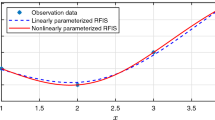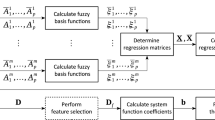Abstract
In this paper, we propose a hybrid identification of information granulation-based fuzzy models by means of multi-objective optimization and successive tuning method. The proposed multi-objective algorithm using a nondominated sorting-based multi-objective strategy is associated with an analysis of solution space. The granulation of information is realized by means of the C-Means clustering algorithm. Information granules formed in this way become essential at further stages of the construction of the fuzzy models by forming the centers of the fuzzy sets constituting individual rules of the inference schemes. The overall optimization of fuzzy inference systems comes in the form of two identification mechanisms: structure identification (such as the number of input variables to be used, a specific subset of input variables, the number of membership functions, and polynomial type) and parameter identification (viz. the apexes of membership function). The structure identification as well as parameter identification is simultaneously realized with the aid of successive tuning method. The evaluation of the performance of the proposed model was carried out by using two representative numerical examples such as NOx emission process data and Mackey-Glass time series. The proposed model is also contrasted with the quality of some “conventional” fuzzy models already encountered in the literature.
Access this chapter
Tax calculation will be finalised at checkout
Purchases are for personal use only
Preview
Unable to display preview. Download preview PDF.
Similar content being viewed by others
References
Pedrycz, W.: An identification algorithm in fuzzy relational system. Fuzzy Sets Syst. 13, 153–167 (1984)
Oh, S.K., Pedrycz, W.: Identification of Fuzzy Systems by means of an Auto-Tuning Algorithm and Its Application to Nonlinear Systems. Fuzzy Sets and Syst. 115, 205–230 (2000)
Park, B.J., Pedrycz, W., Oh, S.K.: Identification of Fuzzy Models with the Aid of Evolutionary Data Granulation. IEEE Proc.-Control Theory and Applications 148, 406–418 (2001)
Lin, F.J., Teng, L.T., Lin, J.W., Chen, S.Y.: Recurrent Functional-Link-Based Fuzzy-Neural-Network-Controlled Induction-Generator System Using Improved Particle Swarm Optimization. IEEE Trans. Indust. Elect. 56, 1557–1577 (2009)
Huang, W., Ding, L., Oh, S.K., Jeong, C.W., Joo, S.C.: Identification of fuzzy inference system based on information granulation. KSII Transactions on Internet and Information Systems 4, 575–594 (2010)
Setnes, M., Roubos, H.: GA-based modeling and classification: complexity and performance. IEEE Trans. Fuzzy Syst. 8, 509–522 (2000)
Ishibuchi, H., Nojima, Y.: Analysis of interpretability-accuracy tradeoff of fuzzy systems by multiobjective fuzzy genetics-based machine learning. Int. J. Approx. Reaso. 44, 4–31 (2007)
Oh, S.K., Pedrycz, W., Prak, H.S.: Hybrid identification in fuzzy-neural networks. Fuzzy Set Syst. 138, 399–426 (2003)
Park, H.S., Oh, S.K.: Fuzzy relation-based fuzzy neural-networks using a hybrid identification algorithm. Int. J. Cont., Autom. Syst. 1, 289–300 (2003)
Park, H.S., Oh, S.K.: Multi-FNN identification based on HCM clustering and evolutionary fuzzy granulation. Int. J. Cont., Autom., Syst. 1, 194–202 (2003)
Oh, S.K., Pedrycz, W., Prak, H.S.: Implicit rule-based fuzzy-neural networks using the identification algorithm of hybrid scheme based on information granulation. Adv. Eng. Inform. 16, 247–263 (2002)
Choi, J.N., Oh, S.K., Pedrycz, W.: Identification of fuzzy relation models using hierarchical fair competition-based parallel genetic algorithms and information granulation. Applied Mathematical Modelling 33, 2791–2807 (2009)
Jang, J.S.R.: ANFIS: adaptive-network-based fuzzy inference system. IEEE Trans. Syst., Man Cybern. 23, 665–685 (1993)
Duan, J.C., Chung, F.L.: Multilevel fuzzy relational systems: structure and identification. Soft. Comput. 6, 71–86 (2002)
Chen, Y., Yang, B., Abraham, A.: Automatic design of hierarchical Takagi-Sugeno type fuzzy systems using evolutionary algorithms. IEEE Trans. Fuzzy Syst. 15, 385–397 (2007)
Author information
Authors and Affiliations
Editor information
Editors and Affiliations
Rights and permissions
Copyright information
© 2011 Springer-Verlag Berlin Heidelberg
About this paper
Cite this paper
Huang, W., Oh, SK., Kim, JT. (2011). Design of Information Granulation-Based Fuzzy Models with the Aid of Multi-objective Optimization and Successive Tuning Method. In: Liu, D., Zhang, H., Polycarpou, M., Alippi, C., He, H. (eds) Advances in Neural Networks – ISNN 2011. ISNN 2011. Lecture Notes in Computer Science, vol 6677. Springer, Berlin, Heidelberg. https://doi.org/10.1007/978-3-642-21111-9_28
Download citation
DOI: https://doi.org/10.1007/978-3-642-21111-9_28
Publisher Name: Springer, Berlin, Heidelberg
Print ISBN: 978-3-642-21110-2
Online ISBN: 978-3-642-21111-9
eBook Packages: Computer ScienceComputer Science (R0)




